Welcome to another issue of The Newport Cornucopia where we dig through the newspapers archives for interesting news articles and adverts. All articles are posted verbatim and most headlines are original (headlines in quotes are my own).

Dreadful Hail Storm
On Thursday, the 28th ult:, this town was visited by one of the most severe hail storms ever witnessed by the oldest inhabitants. It commenced about twelve o'clock at noon, and continued for about three-quarters of an hour.
The hail-stones were full as large as common marbles, consequently the sky-lights, windows, &c. suffered considerable damage, and the gardens in the town and immediate neighbourhood are completely destroyed the fruit trees were stripped of fruit and leaves, and even small branches were knocked off; cabbages, peas, beans, &c. were battered to pieces. Two pigs which sought shelter in a shed near the town, were drowned during the storm, which was accompanied by the most awful peals of thunder.
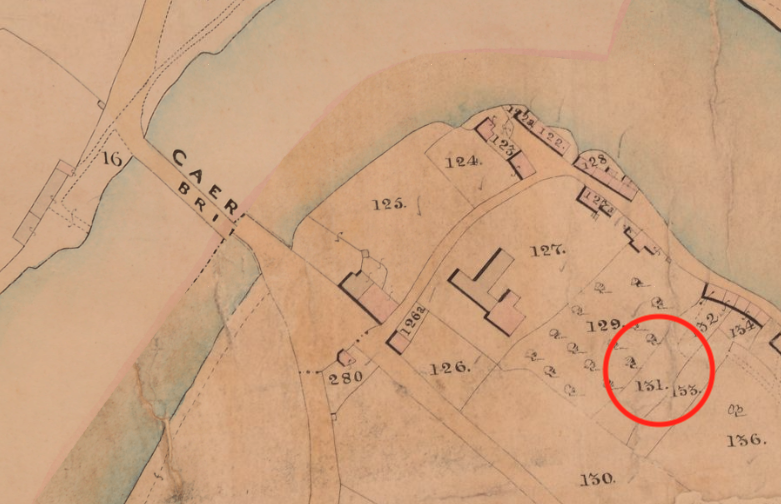
The lightning struck the house of Mr. Howell, gardener, situate in the village of Ultra Pontem, passed down the chimney, entered, just above the mantel-piece, a room upstairs, occupied by a Miss Morgan (who fortunately at the time was standing by the window), shot across a looking-glass, breaking it in one corner only, where it came in contact with the frame, then taking the wall, tore off the plastering, throwing it and the chimney ornaments with great violence against the opposite part of the room, it shot up a corner through the ceiling, and passing through the pine-end of the house, esscaped without doing any further damage.
Sad was the fate of sundry joints which were roasting in the houses of that part of the community who keep up the Gothic custom of dining atone, for the hail in its course down the chimney, brought with it such quantities of soot as to spoil every thing in the shape of eatables that happened to be near the fire. The ground was covered with hail to the depth of six inches, but happily the storm did not extend above half-a-mile beyond the limits of the town in any direction.
— Monmouthshire Merlin, 6th June, 1835

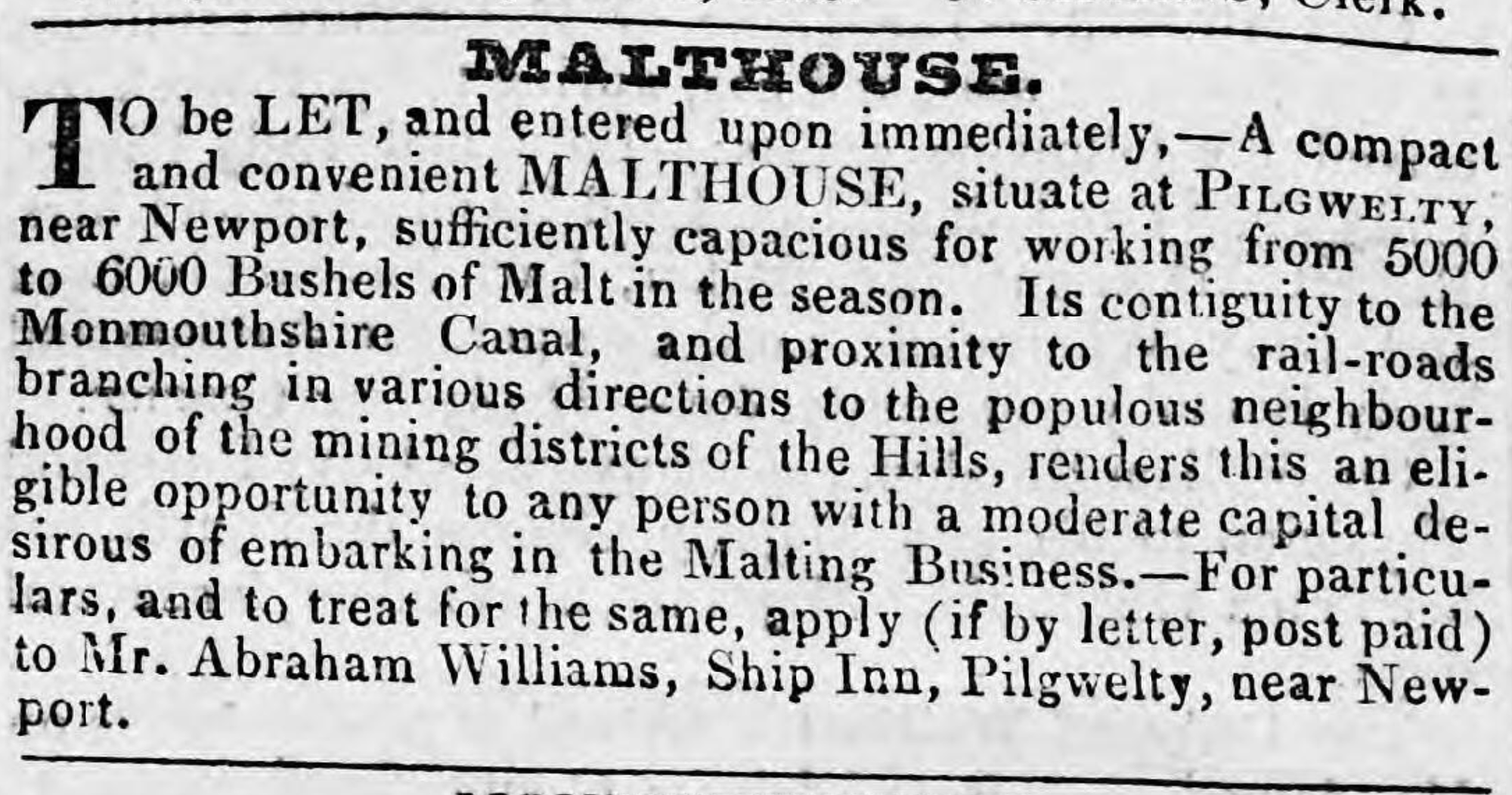

For Sale in 1835: The Carpenter's Arms
In November 1835, an advert was published in the Monmouthshire Merlin for the sale of the Carpenter's Arms Inn and nearby buildings. Interestingly, the advert mentions the Carpenter's Arms Inn as being one of the 'oldest established' inns in the town which does provide an element of evidence to the pub's claims to being the oldest in Newport.
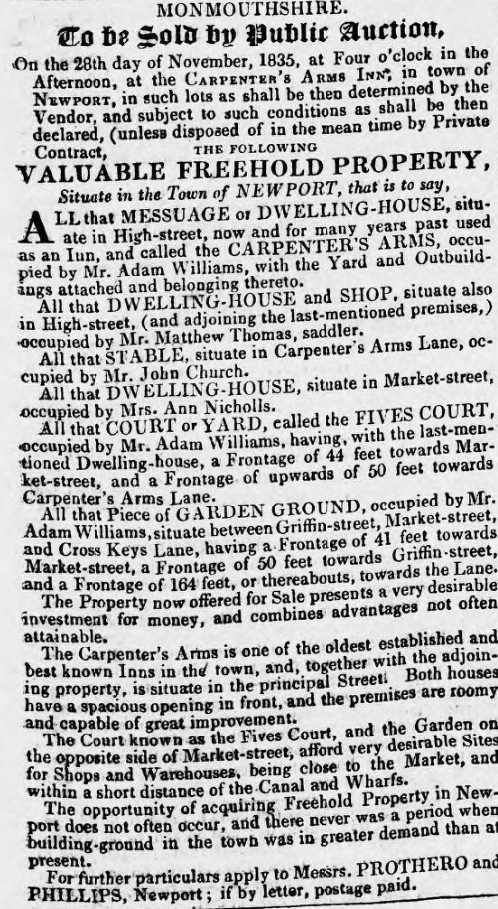
The following were for sale:
- The Carpenter's Arms Inn itself including the yard and outbuildings attached occupied by Mr Adam Williams.
- A shop and house next door to the Carpenter's Arms Inn. As the lane is on one side of the pub, this is likely to be where McCann's is today. The buildings are identical so likely existed together at the same time.
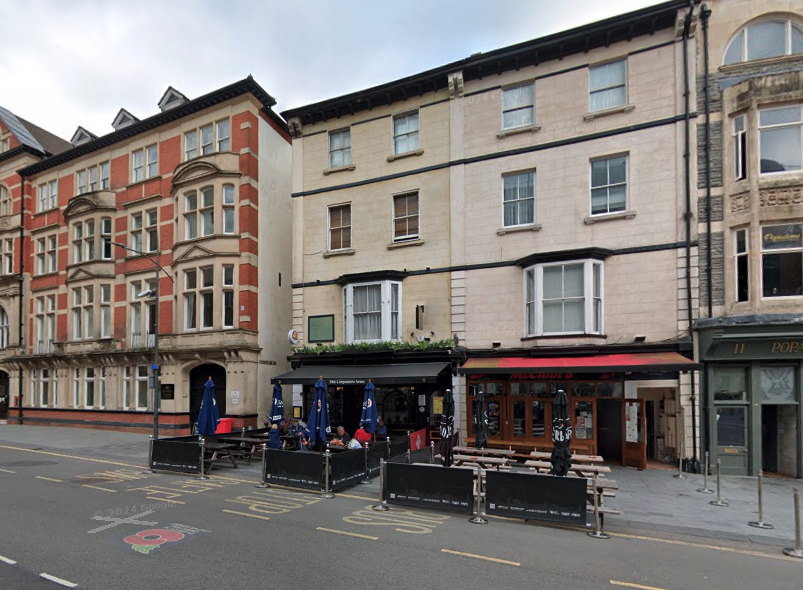
- A stable in Carpenter's Arms Lane
- A house in Market Street occupied by Mrs Ann Nicholls
- A court or yard called Fives Court with frontages on Market Street and Carpenter's Arms Lane and occupied by Adam Williams, occupier of the Carpenter's Arms Inn.
- A garden in between Market Street and Griffin Street occupied by Adam Williams. The map below shows the likely location of the garden.

Fives Court
I'm intrigued by the mention of Fives Court. Based on the description of what's for sale it would seem that there was the Carpenter's Arms Inn at the north of Carpenter's Arms Lane with a yard, outbuilding and stable behind and then Fives Court taking up the plot at the point where Carpenter's Arms Lane meets Market Street (see screenshot below).
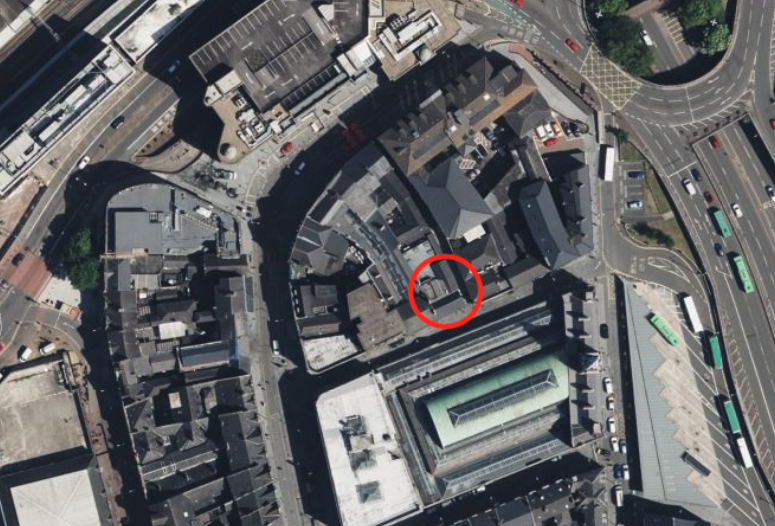
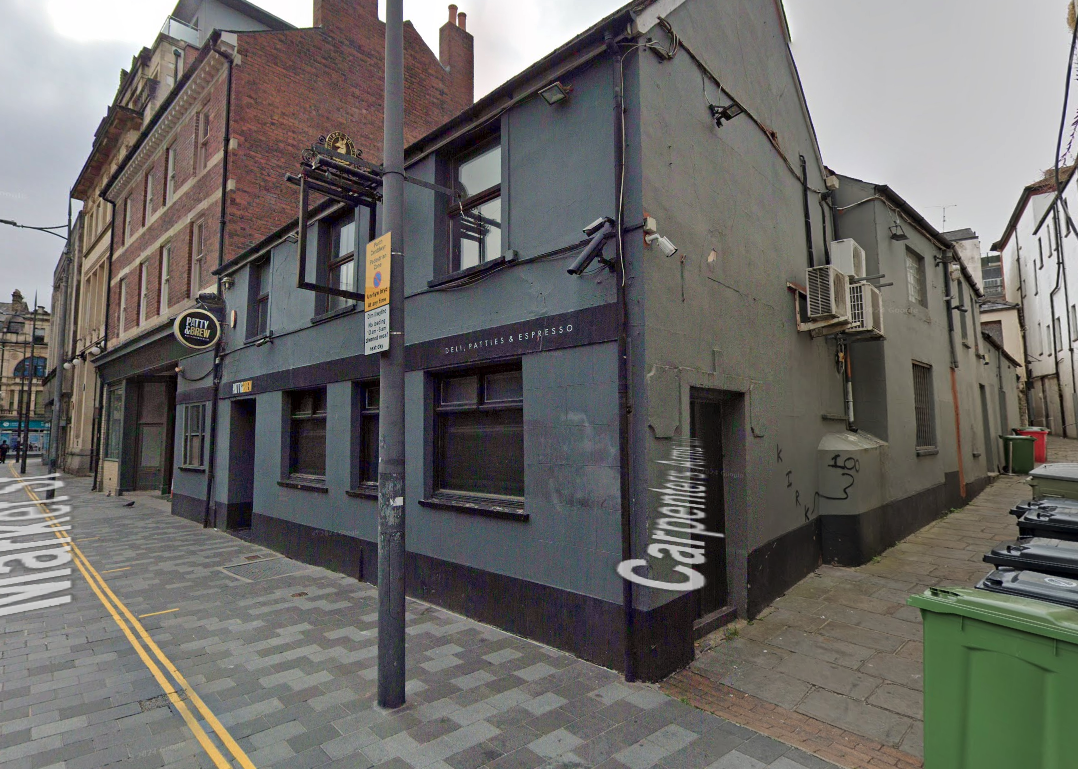
Possible location of Fives Court
Fives is a wallball sport similar to squash but played with the hands instead of a racquet. The game has been played in Britain since at least Elizabethan times and is often associated with Eton although other variants exist.
A Fives court can easily fit within the frontages mentioned in the advert — a Rugby Fives court has a width of 18 feet and length of 28 feet and the Fives Court mentioned in the advert had a frontage of 44 feet on Market Street and upwards of 50 feet on Carpenter's Arms Lane.
Being called Fives Court would seem to hint at it being used for that purpose, the word not really having any other meaning. Fives was being played in Wales at the time of the advert and an article on the Eton Fives Association described it as being something of a national pursuit.
In "A Description of Caernarvonshire 1809-11" Edmund Hyde Hall says of Welsh sports, "Quoits and skittles I have sometimes, though not often, observed: but fives may be almost termed a national pursuit, in which both boys and men very generally and eagerly engage.
👉 So, was Fives being played in Newport in the 1830s?

Coins
It may be interesting to the antiquary to learn that some men engaged in digging about in the churchyard of the ancient town of Caerleon, have discovered several Roman coins; one of Constantine the Great, and another of nearly the same date (314 or 324), a small gold ornament, and a looking glass, nearly three-quarters of an inch in thickness, but, unfortunately, the man who found it broke it with his pickaxe before he discovered what it was.
Some human skeletons, too, were discovered, the bones of which seem to have been acted upon by fire they are supposed to have lain there since the sacking of the town (then a city), by Owen Glendwr.
— Monmouthshire Merlin, 6th June, 1835

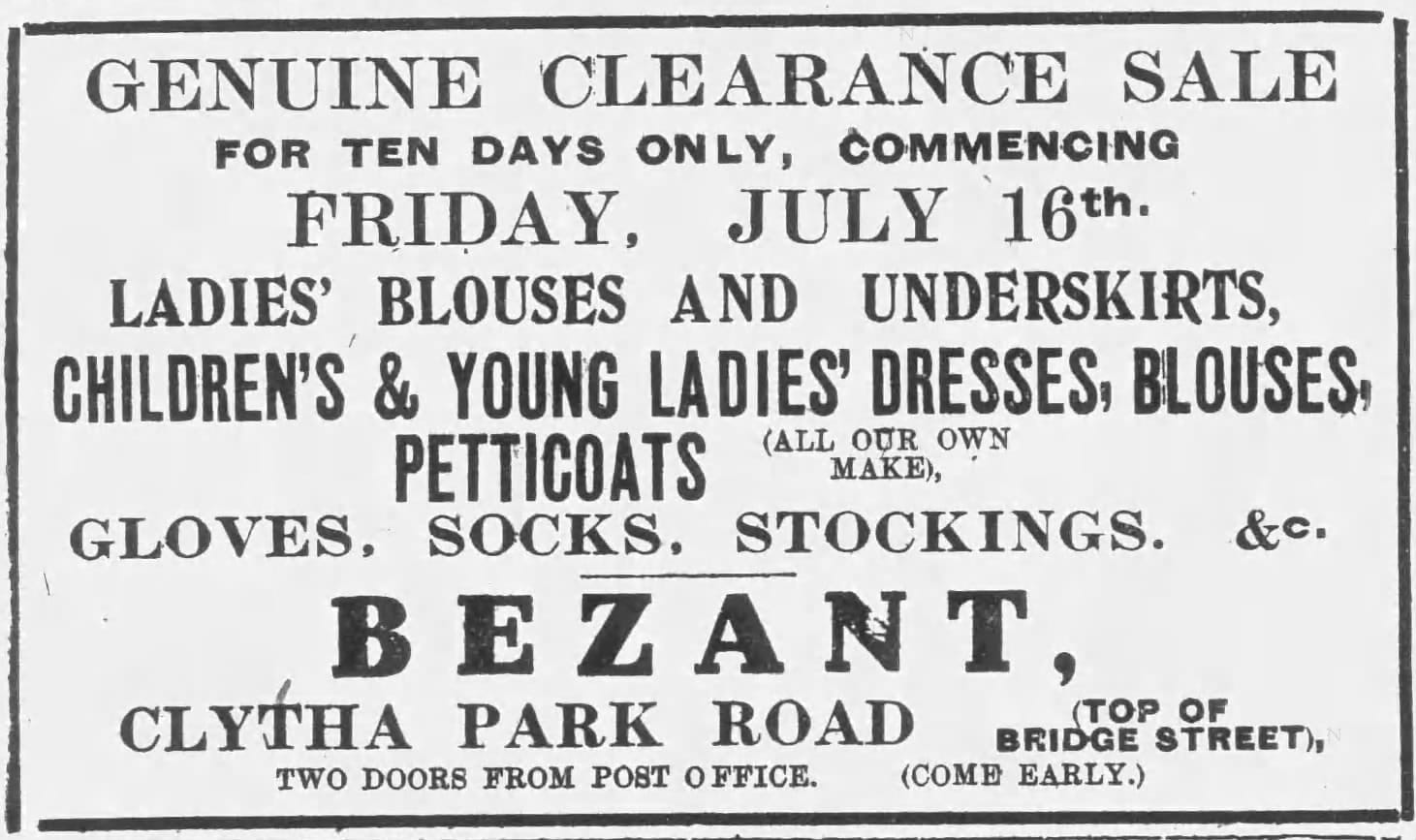


Potato Stealing
Henry Cooper and Thomas Sharpe were charged with stealing 10lbs. weight of potatoes from the grounds of the Rev. Thomas Pope (who on the charge being called on, left the Bench.) P.S. Jonathan Beswick gave evidence in support of the charge. He said that on Monday last he saw the prisoners near a potato-field belonging to the Rev. Thomas Pope; he crossed the hedge, and on coming up with Sharpe, he searched him, and found potatoes in a handkerchief, evidently just dug from the ground he said his companion had bought them for 6d.; took him in charge, and compared the footmarks in the field with Sharpe's shoes, and found them to correspond. P.C. Henry Ingram said that they acknowledged their guilt to him. Committed for 14 days, with hard labour.
— Monmouthshire Merlin, 3rd October, 1857
An Imposter
Sarah Smith was brought up on a charge of vagrancy, and with pretending to be deaf and dumb, for the purpose of exciting sympathy. P.C. Trewartha saw prisoner at Tredegar Park, making signs that she was in distress; he told her that he would take her to a medical man for examination could elicit no reply at that time, but at Ebbw-Bridge she spoke; she said that was the first time she had tried on that dodge." Committed to the House of Correction for one month.
— Monmouthshire Merlin, 3rd October, 1857
'A Fat, Brazen, Amazonian Lady of the Pavé'
Mary Joseph, a fat, brazen, and Amazonian lady of the pavé, was charged with robbing from the person of Matthew Powell, a saddler, of Abergavenny, the sum of 8s.
Mr. Birch appeared for Powell, and Mr. Phillpotts for the prisoner. The prosecutor stated that he came to Newport from Abergavenny on Friday last, for the purpose of going to Bristol, and that from some cause or other he was out late that night in this town, and was going to Butcher Parry's, to sleep for the night; but finding his house closed, he returned again towards the Station-house, feeling assured that he could sleep there that night. In passing by the Red Cow to do so, he saw the prisoner standing up in the road, who addressed him in very seducing terms, and asked him where he was going to sleep.
He replied that he was too late for lodgings, and thought of sleeping at the Station-house, or walking about till day-light. She closed up, and put her right hand into his breeches pocket. He laid hold of her arm before she took her hand out, but she succeeded in pulling it out and 8s. or 9s. with it. He struggled to get the money, but she let fly at him with her masculine fist, struck him three or four terrible blows, and bolted.
She took the road to Friars' fields, closely pursued by prosecutor, and rushed into the back-door of a house, and entered, shutting the door behind her. He then thought to go to the Station, and for that purpose walked around the corner of the house in which he saw the prisoner enter. He saw a light in the front window, and walked up to it, when he heard a person talking, whom he thought was the prisoner, from the voice. He heard her say that she had eased a fellow of 8s. or 9s., and then heard the money thrown upon the table.
Raising the latch of the door, he told the inmates that he had been robbed, and believed the woman who robbed him was then there. A short man came to the door, who ordered him off, and struck him a violent blow under the ear. He then went to the police, and on his return found they were all gone to bed. They were awoke by the police, who took the prisoner into custody.
Cross-examined by Mr. Phillpotts: I did not point out another woman to Huxtable, the police constable, as the woman who robbed me, nor did I accuse any other besides the prisoner. I did not hear the constable say, with respect to another woman at the house of prisoner,
"You d__d fool, that woman has no legs!" (meaning Mary the Cripple)
I lost two sovereigns and two handkerchiefs the same evening, but I cannot tell with whom—it was a woman who was rather thin, and at a house in Friars' Fields.
[The fellow here detailed the most disgusting conduct that could possibly disgrace a man, a husband, and a father; and evinced throughout just as much contrition for his thoughtless and shameless proceedings, as could be expected from such a character.]
Cross-examination continued: I am a married man, with a wife and six children living, with whom I reside in the New-road, Abergavenny. I had been drinking with no woman here—only drinking with Mr. Francis I can't say how much beer, but we had no spirits. I gave the woman a pint of beer who robbed me of two sovereigns, but I did not drink any of it, as it was drunk by the "establishment." We have no such establishment in Abergavenny, and if there is one in Market-lane in that town, I never visited it. The two sovereigns were in my pocket, but fearing a loss of my money, I put my silver down in my boot before I was robbed, as I had made up my mind for a spree before I came to Newport.
Mr. Phillpotts was proceeding in his cross examination, when he was interrupted by the Mayor, who said the case was too foul to be suffered to proceed further.
Mr Hawkins said that if the prisoner were committed, the jury would not hear the case, when they considered the shameful depravity of the prosecutor—a married man, and a father of a large family. It was disgraceful conduct of a man so situated. to get into such bad company, to drink so much as it appeared he had, and then subject himself to be robbed of two sovereigns and in a few hours after, to allow himself again, through his own foolish imprudence, to be robbed of eight or nine shillings.
The case altogether was a most disgraceful one, and one which it would be preposterous to suppose a jury would entertain. The case was therefore dismissed.
— Monmouthshire Merlin, 3rd October, 1857

'Mud on the Streets'
To the Editor of the Monmouthshire Merlin.
Sir,—Although a stranger in Newport, I trust you will, through the medium of your widely spread journal, allow me to make a few observations respecting some of the disadvantages this important town unfortunately labours under; my motive being its improvement.
It has been remarked that persons at a distance see more of a battle than those who are actually engaged in it: I, as a stranger here, see things that may escape the attention of a resident.
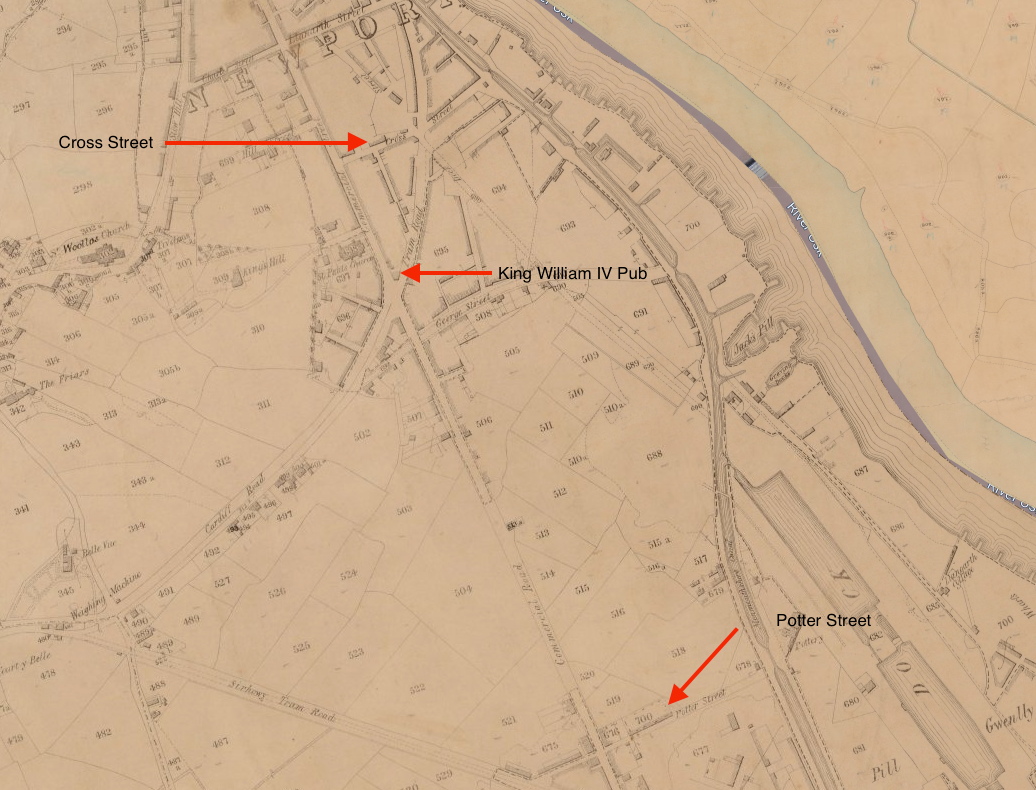
The first thing that struck my attention as being a great nuisance, that common vigilance on the part of those whose duty it is to attend to those matters might easily prevent, was the accumulation of mud at the bottom of Cross-street, and the crossing from the William the Fourth to George-street.
Still, this was but a trifle when compared to the mud-bank in Potter-street, leading to the dock. The row of houses here appear to be half buried.
Upon inquiry I was informed that this is occasioned by the laying down of pipes, to conduct water from the canal to the barracks. But why the health and comfort of some 70 or 80 individuals should be destroyed, and the deterioration of the value of property suffered by the authorities of your town, I was certainly at a loss to comprehend even the very sewers and drains are all stopped. This loudly calls for the interference of local authority.
Passing onwards the splendid dock came full in view this will doubtless greatly lend to increase the welfare of your town. I was, however, sorry to learn that some of the most wealthy gentlemen in the neighbourhood look with apathy upon the noble example thus set before them, and put not their shoulder to this laudable work. The banks of the canal loudly call for the assistance of the scavenger. The broken flags, and consequent pools of water in the principal streets, is certainly anything but creditable to present "Proprietors of the soil."
St. Woollos Church-yard, too, is most outrageous; the graves being sown one upon another as thick as grass. I trust you will pardon these observations, and that they will be taken in the manner in which they are meant, namely, the welfare of the town.
TRAVELLER.
— Monmouthshire Merlin, 2nd October 1841

Coroner's Inquest
The following in a correct account of the accident which occurred near Caerleon last week.
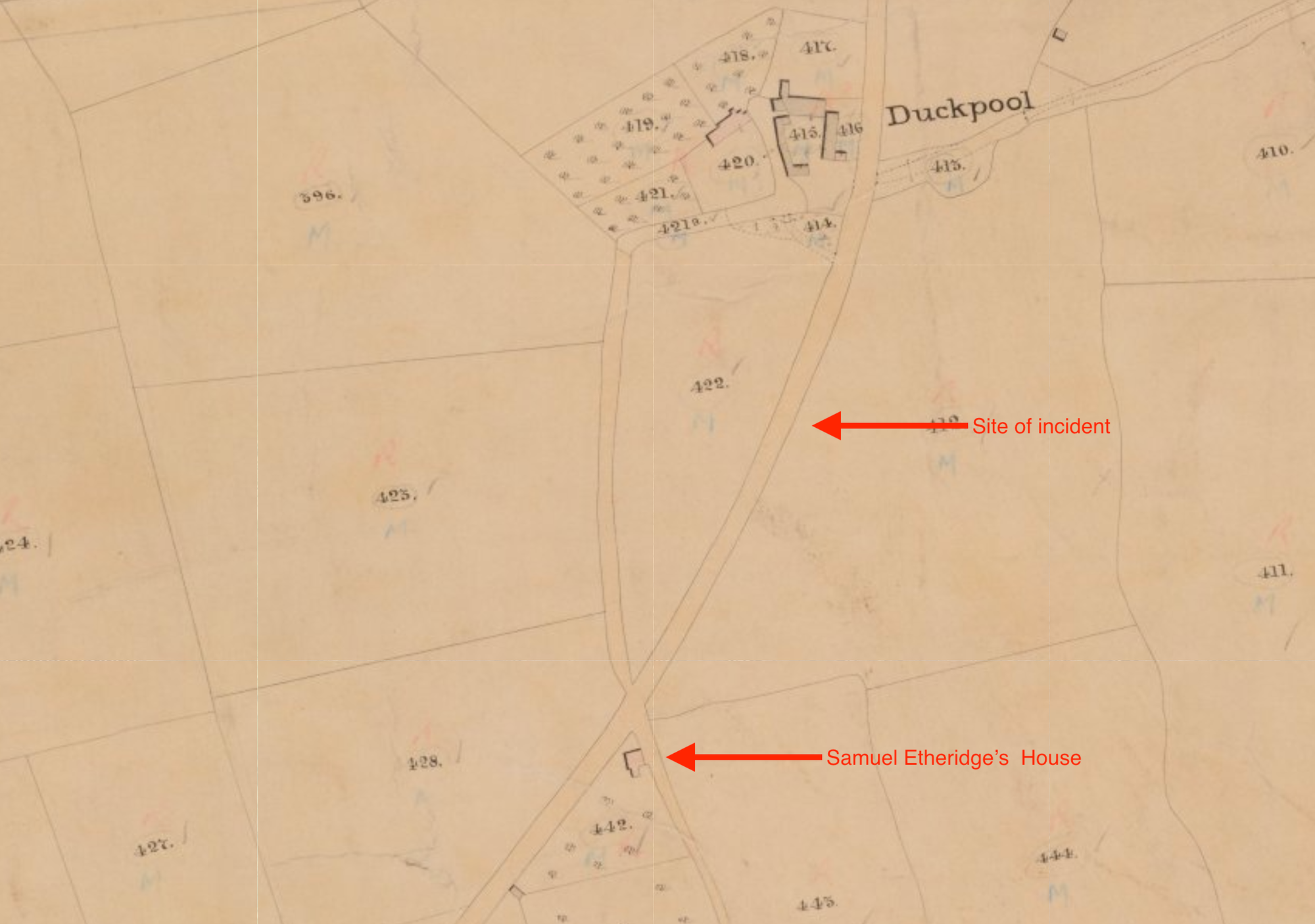
On Thursday morning last a Coroner's inquest was held at S. Etheridge's, Fair Oak Cottage, before Wm. Brewer, Esq and a respectable jury, on the body of William Francis aged 47, servant with Messrs. W. and E. Jones, Millers, Caerleon who was killed on the road leading from Newport to Caerleon, near the first mile-stone, by the waggon having ran over his body in attempting to stop the horses, which had gone off at full speed.
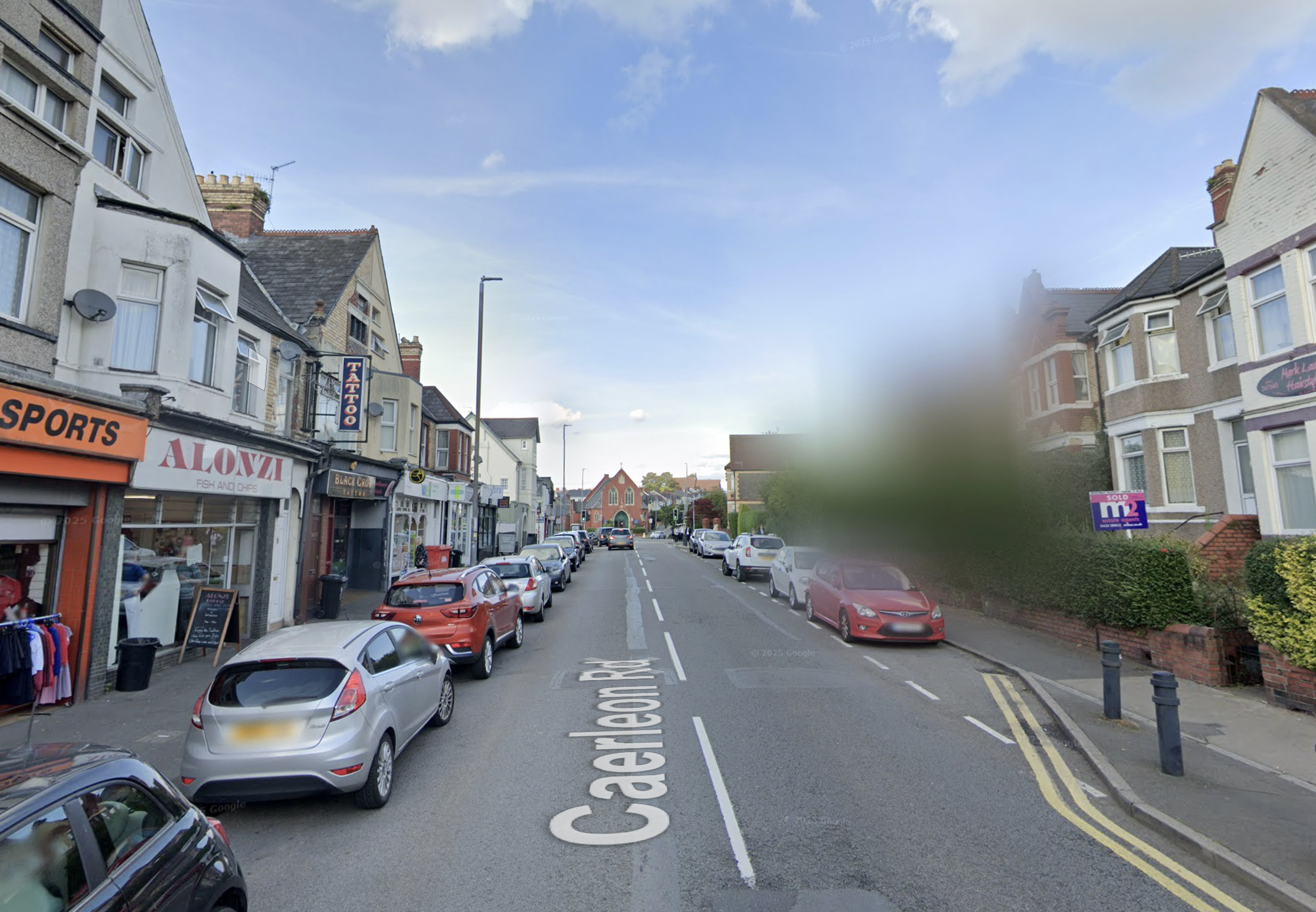
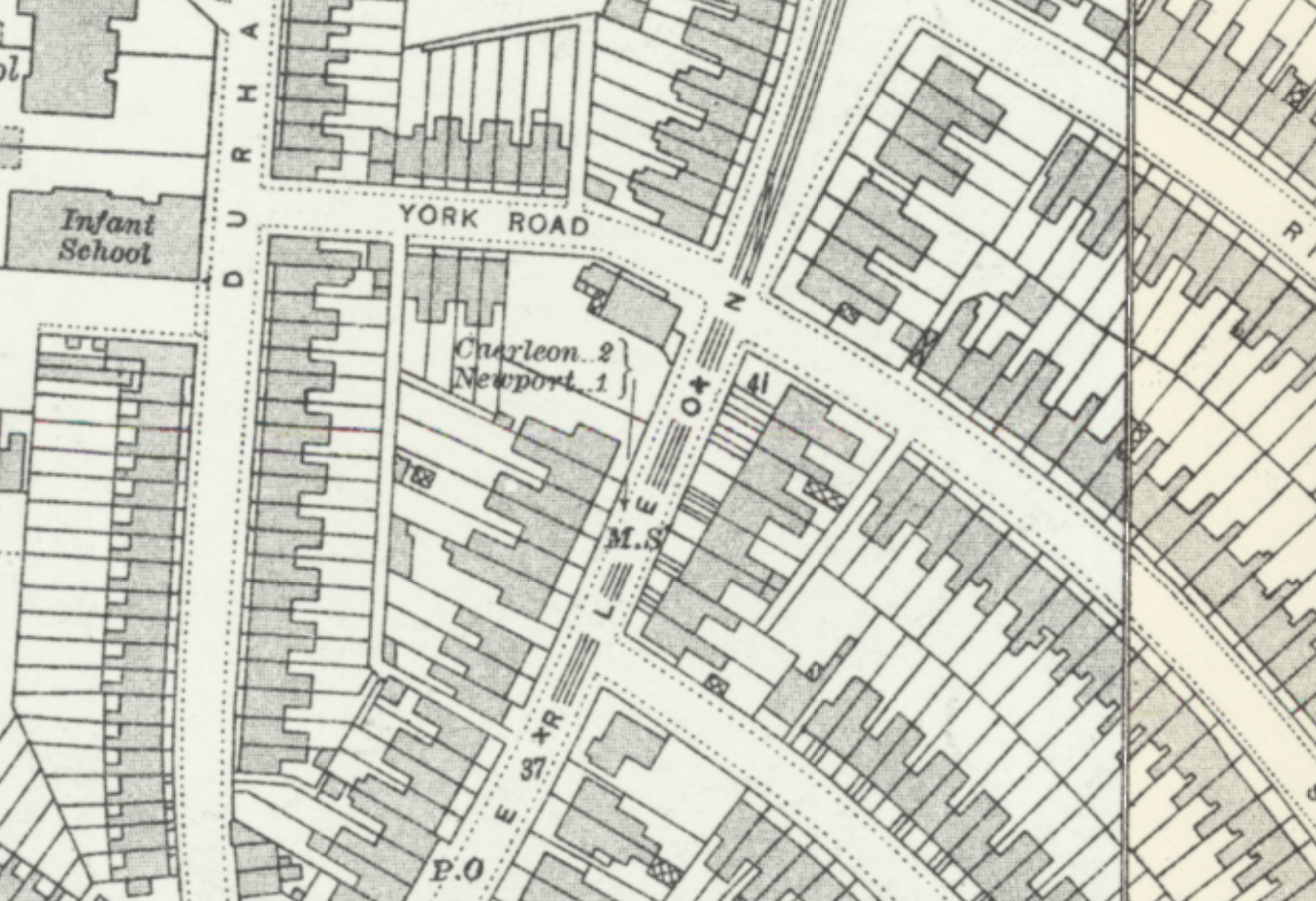
The first mile stone would have been around this area of Caerleon Road.
It appeared from the evidence of John Thomas, his fellow-servant, who with two boys were riding in the covered waggon at the time, that the horses took fright just after passing the cottage aforesaid, and that be Thomas, got out as soon as possible and ran after them but did not overtake them for more than a quarter of a mile— he then missed Francis and the oldest boy he had left in the waggon; after dragging the wheels, he returned, and first found the boy lying on the road, with his head badly cut from falling, in getting out; on proceeding about 50 yards further he found Francis lying at full length, with his arms extended in the direction the waggon had gone, quite dead he then ran into Mr. Etheridge's cottage, who, with his daughter and two other persons, ran to the spot; medical aid was immediately procured, and the body conveyed to Mr. E.'s house when it was found that the waggon must have passed over his back and shoulders, breaking the ribs and breast, which caused instant death, without producing any outward fracture.
The deceased was a particularly sober, steady man and there appeared not the least evidence in proof that he was asleep on the shafts at the time the accident occurred being observed in the act of leading the hinder horse not many minutes before; the most probable conjecture is, that he was struck down in attempting to stop the horses when they first ran off.
— Monmouthshire Merlin, 17th October 1835


'Peggy Pryde at The Empire'
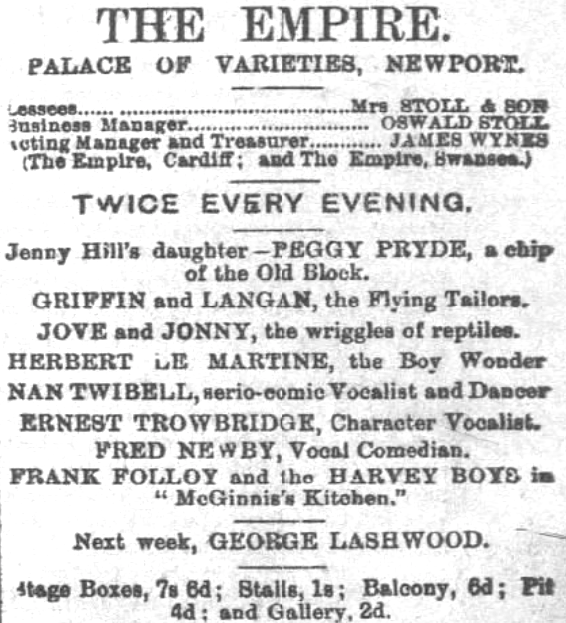
Playing at The Empire on 11th May, 1895 was Peggy Pryde a British music hall performer born in 1867. She began performing in 1877 and appeared throughout the UK for the next couple of decades before playing in New York City and Australia. She moved permanently to Australia in 1911 where she eventually transitioned to talking films.


'Take a Paddle Steamer to Ilfracombe'
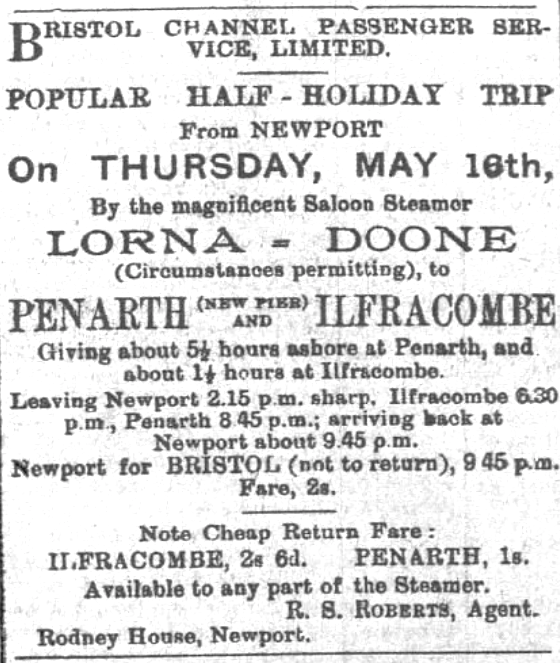
A trip advertised in 1895 allowed passengers to board the Lorna Doone paddle steamer for a trip either to Penarth 'New Pier' or Ilfracombe. The steamer is in the centre in the middle of the photograph below (Source: PaddleSteamers) which was taken at Ilframcombe in the mid 1890s, around about the time of the advert.


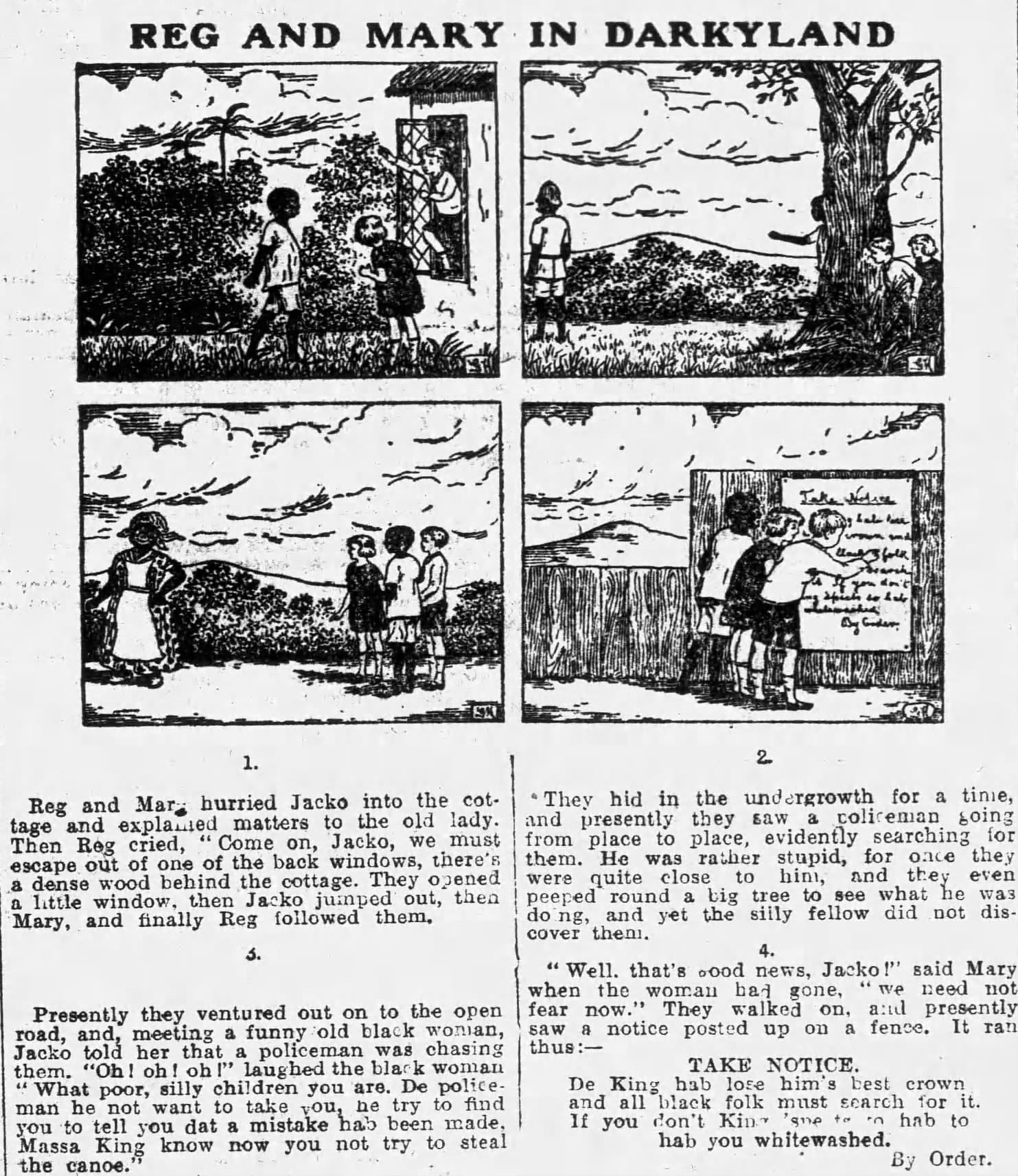

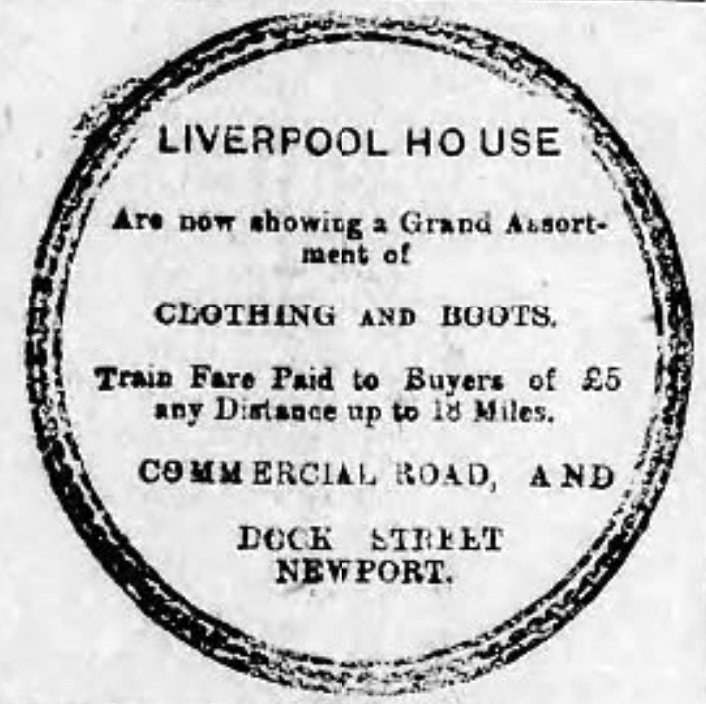
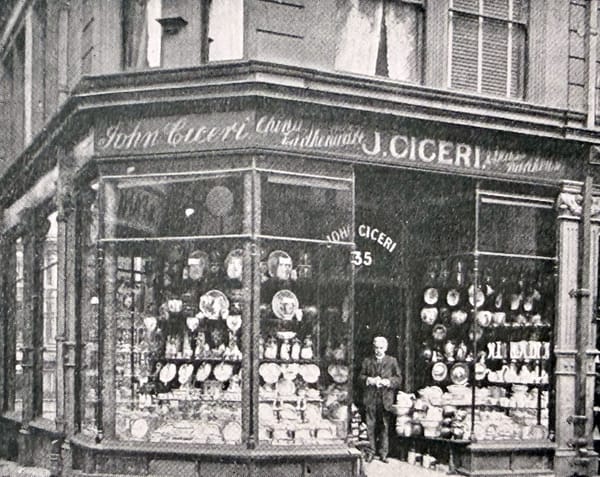
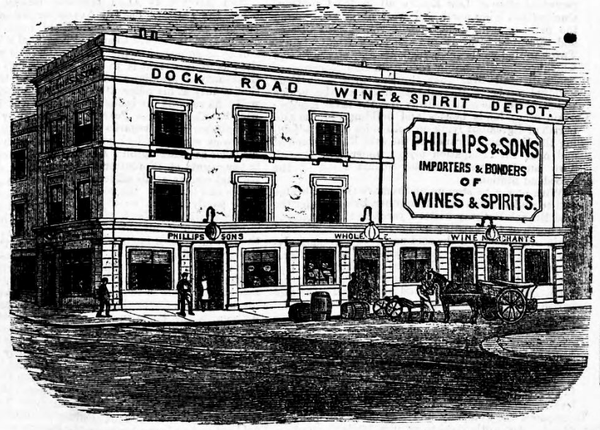
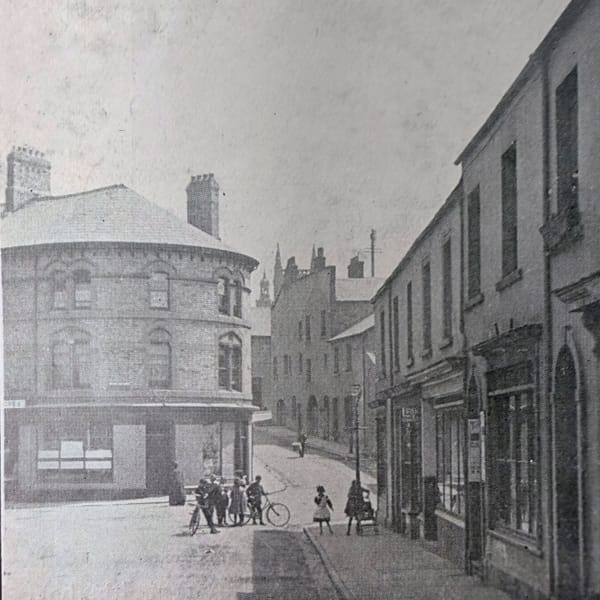
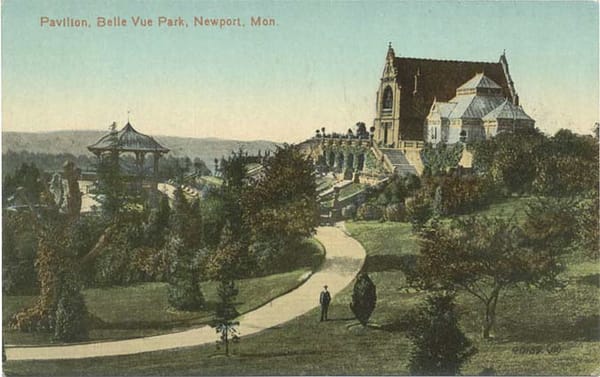
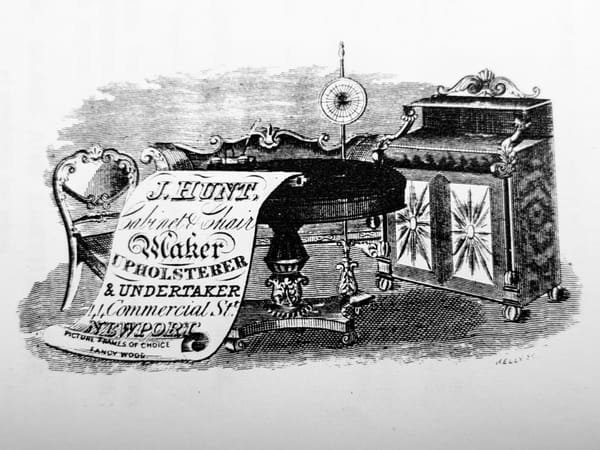
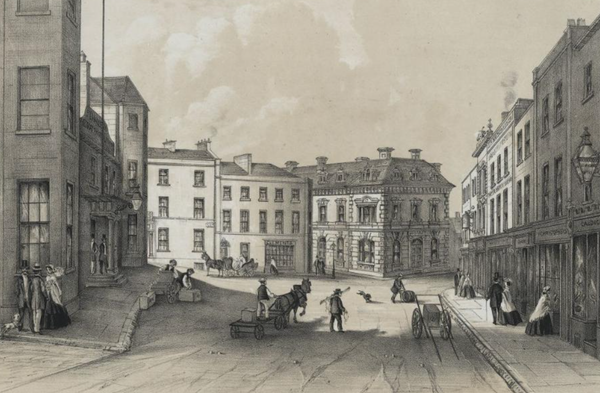
Member discussion